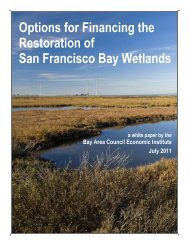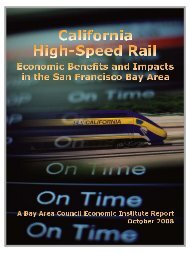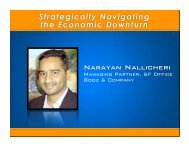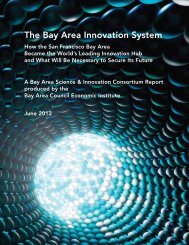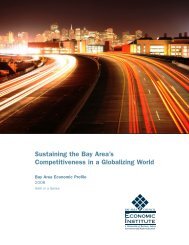Ties That Bind - Bay Area Council Economic Institute
Ties That Bind - Bay Area Council Economic Institute
Ties That Bind - Bay Area Council Economic Institute
You also want an ePaper? Increase the reach of your titles
YUMPU automatically turns print PDFs into web optimized ePapers that Google loves.
28<br />
<strong>Ties</strong> <strong>That</strong> <strong>Bind</strong><br />
� $1 million each from Intel chairman Craig Barrett and from Taiwan Semiconductor<br />
Manufacturing Co. CEO Morris Chang, toward the newly renovated Stanford Nanocharacterization<br />
Laboratory, a nanotech research facility enabling researchers to view<br />
and work with structures as small as two-tenths of billionth of a meter in the development<br />
of new generation semiconductors, fuel cells and materials.<br />
UC Davis’ academic emphases in agricultural, veterinary, public health and environmental sciences<br />
have lured significant numbers of foreign-born Chinese students. Many are enrolled, with<br />
Chinese government support, to study crop yields, resource management, agricultural economics,<br />
treatment of infestations and animal diseases, nutrition, public health and other fields. Davis has<br />
cooperative agreements with seven Chinese and two Taiwanese universities in agronomy, forestry,<br />
range science, biology and agricultural engineering.<br />
Visiting scholar Yanfeng Chen, general manager of Southern China poultry producer Fujian<br />
Sunner Group Co., is part of the management team of the California <strong>Institute</strong> for Food & Agricultural<br />
Research (CIFAR) on the Davis campus. Fuzhou University in Fujian, and Zhejiang<br />
University in Hangzhou, are CIFAR international affiliates. CIFAR also partners with the Chinese<br />
<strong>Institute</strong> of Food Science and Technology (China IFT) and several Chinese universities to<br />
organize China’s International Conference of Food Science and Technology (ICFST), last held in<br />
Guangzhou in November 2005, and the China Food Summit, next scheduled for Xiamen in the<br />
fall of 2006. CIFAR executive director Dr. Sharon Shoemaker, a biochemical engineer, serves on<br />
the scientific organizing committees for the ICFST. She is also an advisory board member for<br />
Shanghai's Jiaotong University’s Bor S. Luh Food Safety Center, and for the Fuzhou Biotechnology<br />
Consultancy Group.<br />
Part of the agenda during the November 2005 China visit of a <strong>Bay</strong> <strong>Area</strong> delegation led by San<br />
Francisco Mayor Gavin Newsom included signing of a faculty exchange/collaborative research<br />
agreement between UC’s California <strong>Institute</strong> for Quantitative Biomedical Research (QB3)<br />
and Peking University’s Center for Theoretical Biology. QB3 is an interdisciplinary effort that<br />
leverages the strengths of engineering and physical sciences at UC Berkeley, engineering and<br />
mathematical sciences at UC Santa Cruz, and the medical sciences at UC San Francisco, as<br />
well as strong biology programs at the three campuses and support from private industry. Peking<br />
University brings to the agreement strengths in theoretical biology and computational modeling<br />
of biological behavior. The Center of Excellence created by the two institutions aims to enhance<br />
the rate at which complex biological phenomena can be quantitatively predicted. Programs will<br />
include the exchange of students and faculty and joint symposia. The Center is aligned with a<br />
broader effort to strengthen UC-China relations called the “10+10 Alliance”, that brings together<br />
the ten University of California Campuses with ten partner universities in China. ICSF<br />
currently has 224 visiting scholars and students from China.<br />
Special academic ties exist between China and Jesuit educational institutions. Jesuit missionaries<br />
first landed in Macao during the 16th century, studied Chinese language and customs, and eventually<br />
reached Beijing. They served as consultants to the Imperial Court in astronomy, chemistry,<br />
physics, music and art, and even ran the Imperial observatory. In the late 19th and early 20th<br />
century, Jesuits taught English to Chinese immigrants and welcomed Chinese children in their



